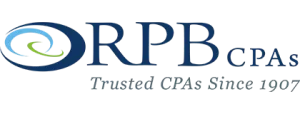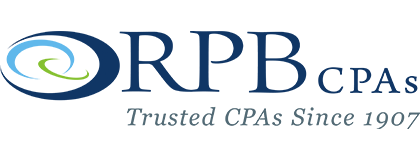RPB_Admin
Does your nonprofit need a CFO?
Your not-for-profit’s ability to pursue its mission depends greatly on its financial health and integrity. If your nonprofit is growing and your executives are struggling to juggle financial responsibilities, it may be time to hire a chief financial officer (CFO). Core responsibilities Generally, the nonprofit CFO (also known as the director of finance) is a senior-level position charged with oversight of accounting and finances. He or she works closely with the executive director, finance committee and treasurer and serves as a business partner to your program heads. A CFO reports to the executive director or board of directors on
The Ever Evolving World of Sales Tax
Each year politicians at the Federal and State level are often torn between increasing taxes or cutting services. Although the Federal government has the ability to run a deficit, avoid raising taxes AND avoid cutting services, the States do not, since they must balance their budgets. In the past, most taxpayers in Wisconsin have focused their tax "complaints" on income and property taxes, since Wisconsin has been historically high on both fronts. As the global landscapes continue to evolve, we see the politicians following that lead while trying to avoid cutting services. To that end, many Wisconsin politicians have turned
How does an employee’s military leave affect 401(k) loan repayments?
When 401(k) plan participants are called to active duty, they often request to suspend their 401(k) plan loan repayments during their military leaves. Many employers may wonder whether the rules for suspending loan repayments during a military leave differ from those applicable to a regular leave of absence. Indeed, they do. Basic rules The rules for suspending loan repayments during a military leave of absence are broader and more flexible than for a regular leave of absence. For a regular leave, the maximum suspension period is one year and the entire loan must be repaid within the maximum permissible
Close-up on financial statements
There are three types of financial statements under U.S. Generally Accepted Accounting Principles (GAAP). Each one reveals different, but equally important, information about your company’s financial performance. And, together, they can be analyzed to help owners, management, lenders and investors make informed business decisions. Profit or loss The income statement shows revenue and expenses over the accounting period. A commonly used term when discussing income statements is “net income,“ which is the income remaining after all expenses (including taxes) have been paid. It’s also important to check out the company’s “gross profit.“ This is the income earned after subtracting
How to outsource your nonprofit’s human resources function
Outsourcing human resources can give your not-for-profit’s staff more time to spend on core duties and mission-driven programs and it may be cost-effective. Here are some suggestions if you’re thinking about outsourcing part or all of your HR tasks. First steps First, decide which segments of the HR function to farm out. Take a look at payroll, recruiting, training, benefits planning and administration, compliance monitoring, leave management and performance reviews. These are all labor-intensive responsibilities where expertise counts. Transferring all or some of them to the right outside party can vault your organization to a higher level of professionalism
Did I Miss a Tax Credit?
Now that "Tax-Time" is unofficially ended for most people many people should be taking time to ask, "Did I miss anything". For the tax professional, "Tax-Time" never ends. It is an ongoing year of planning and review to make sure your clients are in the best position they can be from a tax standpoint. With the passing of the tax overhaul, many professionals are finding this time is more important than the season itself. Without good communication between you and your CPA many things that a business owner does not see as important can be tax windfalls. Most people think
Walking on eggshells: ERISA compliance depends on plan documents
The Employee Retirement Income Security Act (ERISA) covers both defined-benefit and defined-contribution retirement plans. If your organization offers its employees either, you may feel like you’re constantly walking on eggshells with all the regulatory details involved. One critical way to stay in compliance and avoid costly penalties is to ensure your plan operates consistently with its plan documents. Most important requirement Although abiding by your plan documents might sound like a straightforward proposition, this isn’t always the case. ERISA requires plan fiduciaries to discharge their duties solely in the interest of participants and their beneficiaries “in accordance with the documents
Will leasing equipment or buying it be more tax efficient for your business?
Recent changes to federal tax law and accounting rules could affect whether you decide to lease or buy equipment or other fixed assets. Although there’s no universal “right” choice, many businesses that formerly leased assets are now deciding to buy them. Pros and cons of leasing From a cash flow perspective, leasing can be more attractive than buying. And leasing does provide some tax benefits: Lease payments generally are tax deductible as “ordinary and necessary” business expenses. (Annual deduction limits may apply.) Leasing used to be advantageous from a financial reporting standpoint. But new accounting rules that bring leases to
Audits home in on cybersecurity
In 2018, U.S. organizations that suffered a data breach lost an average of $7.91 million as a result. That’s the highest average organizational cost of all the countries and regions covered in the 2018 Cost of a Data Breach Study by IBM and independent research firm Ponemon Institute. Malicious or criminal attacks were the source of more than half of those breaches, rather than system glitches and human errors. With so much at stake, it’s no surprise that auditors consider these issues when conducting their audit risk assessments. This audit season, prepare to answer questions about cybersecurity and the effectiveness
Are your employees ignoring their 401(k)s?
For many businesses, offering employees a 401(k) plan is no longer an option — it’s a competitive necessity. But employees often grow so accustomed to having a 401(k) that they don’t pay much attention to it. It’s in your best interest as a business owner to buck this trend. Keeping your employees engaged with their 401(k)s will increase the likelihood that they’ll appreciate this benefit and get the most from it. In turn, they’ll value you more as an employer, which can pay dividends in productivity and retention. Promote positive awareness Throughout the year, remind employees that a 401(k) remains



